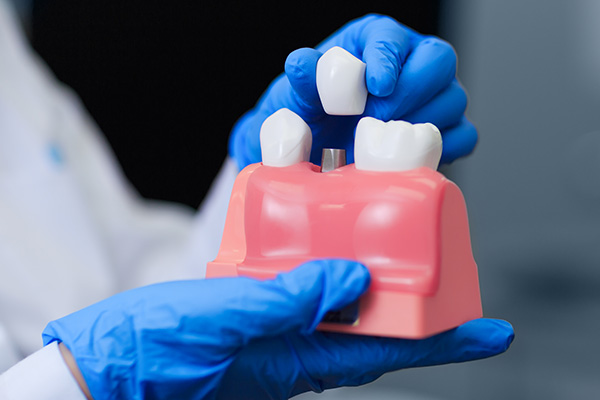 There are several dental implant options for replacing missing teeth. A dental implant permanently replaces a missing tooth, saving smiles and helping people eat their favorite foods for years to come. Unlike other options for replacing missing teeth, dental implants do not require regular check-ups from a dentist.
There are several dental implant options for replacing missing teeth. A dental implant permanently replaces a missing tooth, saving smiles and helping people eat their favorite foods for years to come. Unlike other options for replacing missing teeth, dental implants do not require regular check-ups from a dentist.
The three most common types of dental implants include:
- Endosteal implants
- Subperiosteal implants
- All-on-4 implants®
While all of these implants replace missing teeth, each implant is slightly different. A professional dentist should be consulted to help choose the implant that best fits each person’s needs.
Endosteal implants
An endosteal implant consists of two parts: a small titanium screw and an artificial tooth. The titanium screw is implanted into the jawbone to act as a replacement root. The artificial tooth is attached to the top of the screw. Compared to other dental implants, endosteal implants are the most stable. Endosteal implants also require the longest treatment time because the titanium screw must fuse to the jawbone before the artificial tooth is attached.
Endosteal implants are the most common type of dental implant. However, since the implant is screwed into the jawbone, adequate jawbone density is required to receive an endosteal implant.
Subperiosteal implants
For people that do not have sufficient jawbone density or don’t want an implant in their bone, subperiosteal implants are another option for replacing missing teeth. Unlike endosteal implants, subperiosteal implants are inserted into the gum tissue and placed on top of the jawbone. Subperiosteal implants consist of a metal frame that is implanted in the gum tissue. This frame has posts where artificial teeth are attached. Because the metal frame is not implanted into the jawbone, subperiosteal implants are less stable than endosteal implants but are a suitable dental implant option for people with low jawbone density.
All-on-4 implants
Both endosteal implants and subperiosteal implants are suitable options for people who have lost only a few teeth. If a person has lost an entire row of teeth due to gum disease, All-on-4 implants may be a more fitting option for replacing missing teeth. To attach an All-on-4 implant, a professional dentist will implant four titanium screws into a person’s jawbone. Unlike an endosteal implant, in which only one artificial tooth is attached to each screw, in All-on-4 implants, a full set of artificial teeth is attached on top of the screws. Thus, All-on-4 implants replace more teeth at a time compared to endosteal implants and subperiosteal implants.
Choosing the right dental implant
Having missing teeth may negatively affect a person’s dental health and self-esteem. Luckily, there are several dental implant options for replacing missing teeth. People with sufficient jawbone density will benefit from an endosteal implant. Those with less jawbone density can receive a subperiosteal implant. Those that need to replace an entire set of teeth should consider an All-on-4 implant. Nevertheless, a professional dentist should be consulted to help choose the right dental implant for each person.
Related Posts
If you are missing several teeth or all of your upper or lower teeth or even all the teeth in your mouth, you may be wondering, “What are my options for replacing missing teeth?” Full or partial dentures may be a good option for you. In this article, we’ll discuss what makes a good candidate…
Missing teeth can result from many different things; regardless of how you lost your teeth, there are options for replacing missing teeth. There may be a stigma around dental care breaking the bank, but these options all have their pros and cons, which you should take into consideration.One option many consider is doing nothing. While…
Dental implants are a newer option for replacing missing teeth. They involve a titanium screw inserted into the jawbone, and then months later, once the jawbone has healed and the screw is fused into the bone, a crown is attached to the screw.It can be expensive to get dental implants, but since they offer full…






